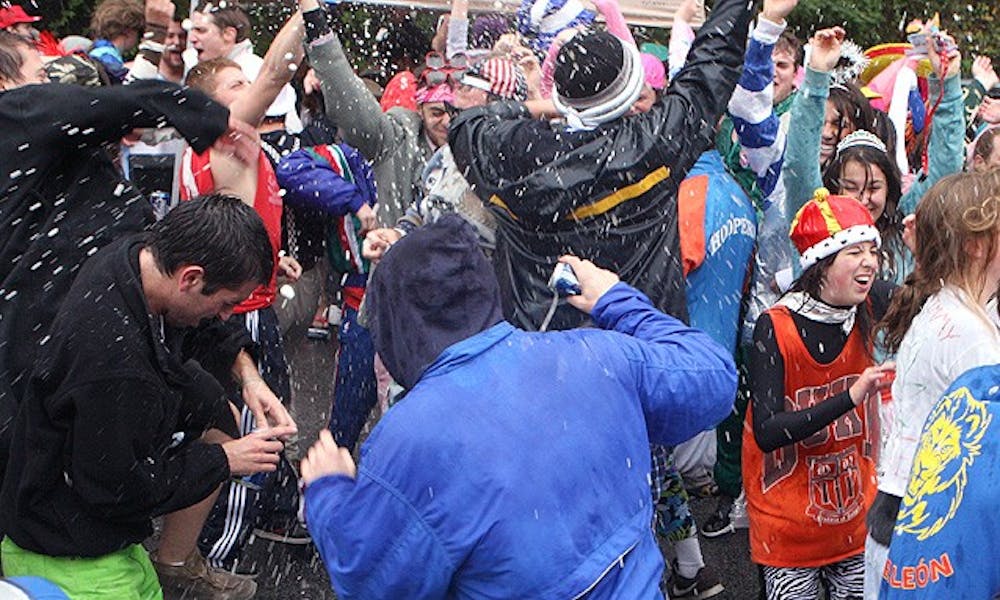Football Gameday strives to foster safer behavior than did Tailgate, but some students fear it will not foster the same sense of community.
The first Football Gameday will commence Saturday to celebrate the first Duke football game against the University of Richmond. This new pre-football event replaces Tailgate, which was canceled after a minor was found unconscious in a Porta Potty after a Tailgate celebration in November. The new event will feature barbecues throughout Main West Quadrangle hosted by registered student groups.
According to an official list provided by Deb LoBiondo, assistant dean for residence life, 18 groups have registered to host a barbecue, 13 of which are fraternities. Missing from the list of registered student groups, however, are selective living groups, of which only one—Wayne Manor—registered. The other four student groups include Wellness Living/Learning Community, the Catholic Student Center, Reformed University Fellowship and the Few Quad resident assistant team.
Junior Chris Brown, Duke Student Government external chief of staff, said it was unclear to students that the term “registered student groups” does not only mean residential student groups. He cited the confusion, as well as the official limit of 75 students per barbecue, as potential reasons for the low number of groups registered for Football Gameday.
The gatherings can begin as early as 3:30 p.m. and must conclude by 6 p.m., according to the registered student group application. Party monitors must be present and University alcohol policies apply, which include limiting alcohol to one six-pack per person and no glass containers.
Brown noted that some student groups, such as sororities, were confused by the 75-student limit per barbecue, thinking that their groups could not host a Football Gameday because each sorority’s membership exceeds 75.
“The number 75 is not intended to limit the groups that can register, it’s just a crowd control function,” Brown said. “If things don’t escalate, we won’t tell the 76th person to leave.”
Senior Brett Schroeder, president of Brownstone, wrote in an email Thursday that although his SLG is supportive of the football team, there was no incentive for the group to host a Football Gameday.
“At $9 to $12 per person [for food], one Football Gameday would put a bit of a damper on Brownstone’s funds, as SLGs just don’t have the disposable income that fraternities do,” Schroeder said. “In that respect, Football Gameday encourages the bigger groups and fraternities on campus to be the ones hosting the Gamedays. And then you have to ask yourself, will the vibe be any different from old Tailgate?”
Schroeder said his group could have its own secluded gathering and spend significantly less money than would be required to host an official Football Gameday celebration.
Ming Jiu Li, a junior and president of Ubuntu, said his SLG will be hosting Football Gameday festivities on Central Campus instead of West Campus because the group is trying to foster community where it resides.
Sophomore Jacob Robinson, member of Wayne Manor, said his group is looking forward to hosting a barbecue and testing the waters of Football Gameday, but he is skeptical that Tailgate’s replacement will be as inclusive to the Duke student body as the former event. He noted that the Last Day of Classes celebration and basketball games are the only other events that have the same power to bring all University students together as well as Tailgate does.
“At Duke, we always talk about divisions along race and greek [or] non-greek.... Tailgate was the only thing that passed through all that,” Robinson said. “Hopefully in the future there will be an event similar to Tailgate where everyone can come celebrate the football team in a big, open atmosphere. [Football Gameday] will turn into exclusive [fraternity] and SLG parties.”
Vice President for Student Affairs Larry Moneta said he disagrees with students’ arguments that Tailgate was all-inclusive.
Dean of Students Sue Wasiolek agreed, adding that calling Tailgate inclusive is a mischaracterization of the event.
“Tailgate’s inclusivity was a fallacy,” Moneta said. “It was a corruption and hijacking of the football game to simulate a drunk-fest with an allegation of bonding.”
Get The Chronicle straight to your inbox
Signup for our weekly newsletter. Cancel at any time.

